牛津深圳版七年级上册Unit 5 Visiting the Moon 课件(共16张PPT)
文档属性
| 名称 | 牛津深圳版七年级上册Unit 5 Visiting the Moon 课件(共16张PPT) |  | |
| 格式 | ppt | ||
| 文件大小 | 472.5KB | ||
| 资源类型 | 教案 | ||
| 版本资源 | 牛津深圳版 | ||
| 科目 | 英语 | ||
| 更新时间 | 2022-10-06 10:20:53 | ||
图片预览

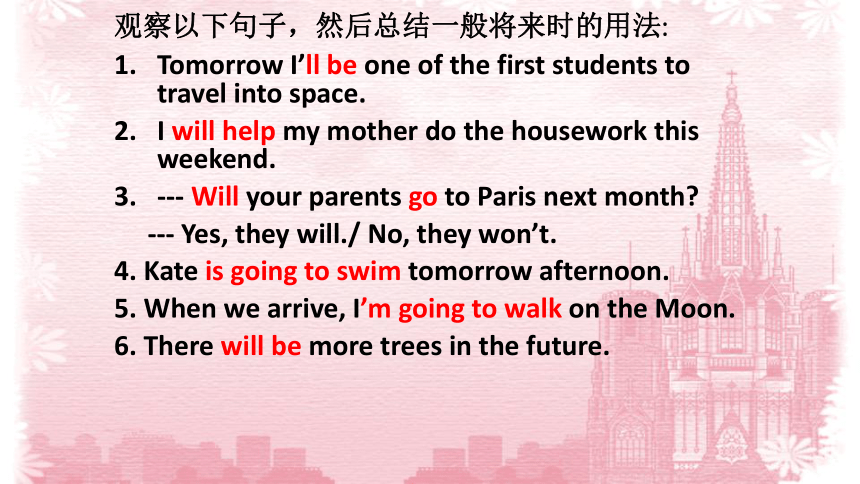
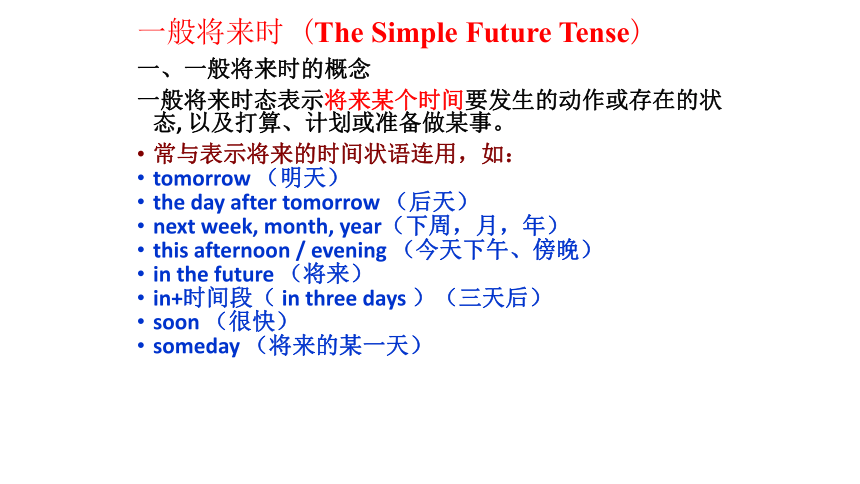
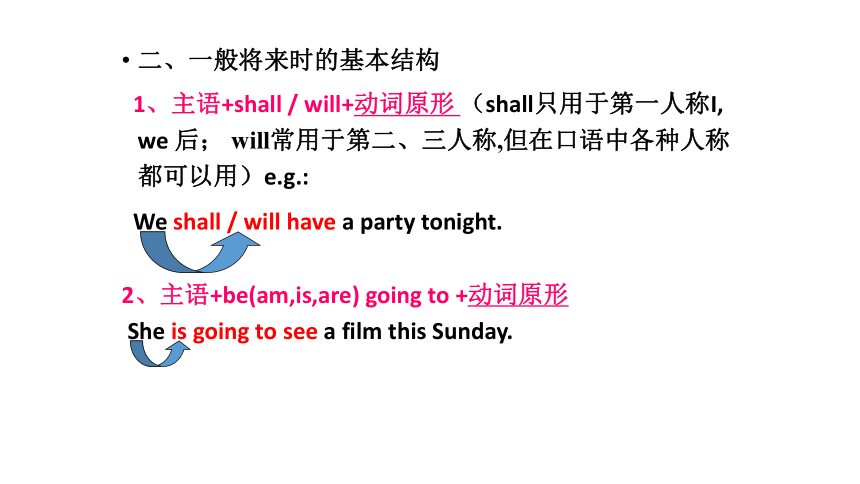
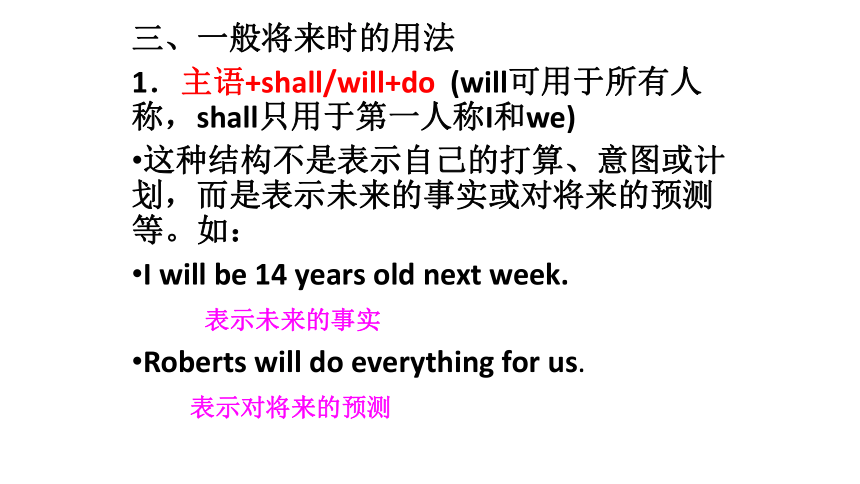
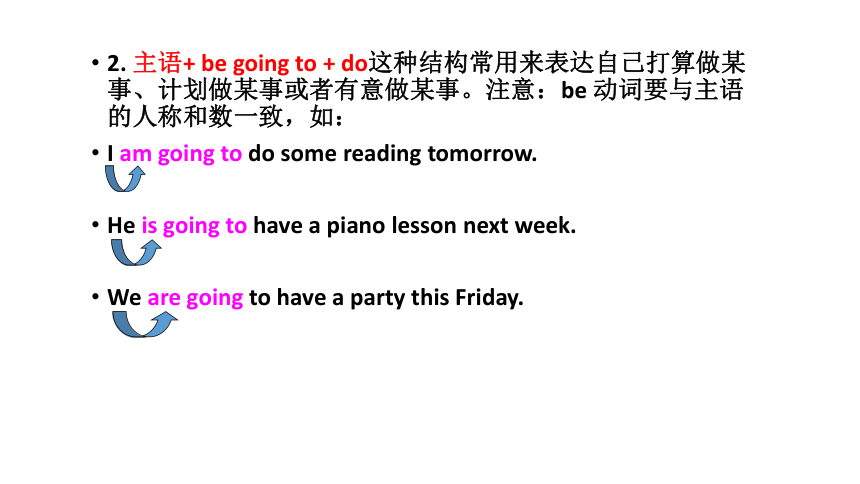
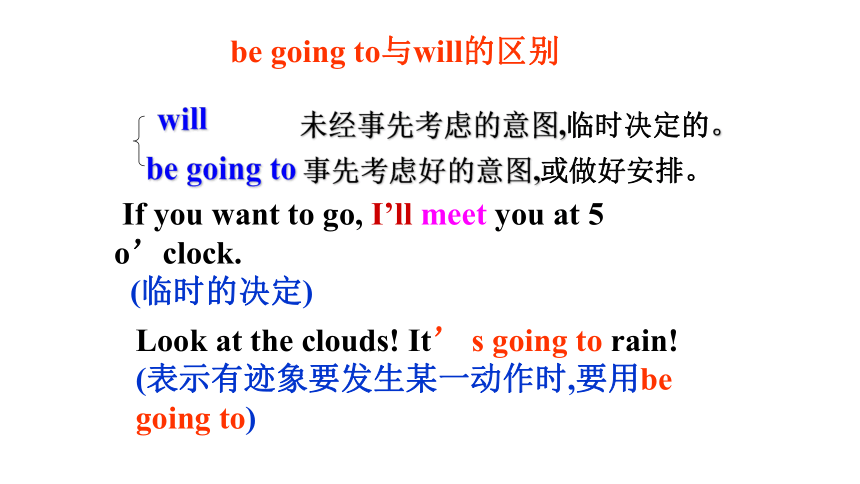
文档简介
(共16张PPT)
The Simple Future Tense
观察以下句子,然后总结一般将来时的用法:
Tomorrow I’ll be one of the first students to travel into space.
I will help my mother do the housework this weekend.
--- Will your parents go to Paris next month
--- Yes, they will./ No, they won’t.
4. Kate is going to swim tomorrow afternoon.
5. When we arrive, I’m going to walk on the Moon.
6. There will be more trees in the future.
一般将来时 (The Simple Future Tense)
一、一般将来时的概念
一般将来时态表示将来某个时间要发生的动作或存在的状态, 以及打算、计划或准备做某事。
常与表示将来的时间状语连用,如:
tomorrow (明天)
the day after tomorrow (后天)
next week, month, year(下周,月,年)
this afternoon / evening (今天下午、傍晚)
in the future (将来)
in+时间段( in three days )(三天后)
soon (很快)
someday (将来的某一天)
二、一般将来时的基本结构
1、主语+shall / will+动词原形 (shall只用于第一人称I, we 后; will常用于第二、三人称,但在口语中各种人称都可以用)e.g.:
We shall / will have a party tonight.
2、主语+be(am,is,are) going to +动词原形
She is going to see a film this Sunday.
三、一般将来时的用法
1.主语+shall/will+do (will可用于所有人称,shall只用于第一人称I和we)
这种结构不是表示自己的打算、意图或计划,而是表示未来的事实或对将来的预测等。如:
I will be 14 years old next week.
表示未来的事实
Roberts will do everything for us.
表示对将来的预测
2. 主语+ be going to + do这种结构常用来表达自己打算做某事、计划做某事或者有意做某事。注意:be 动词要与主语的人称和数一致,如:
I am going to do some reading tomorrow.
He is going to have a piano lesson next week.
We are going to have a party this Friday.
Look at the clouds! It’ s going to rain!
(表示有迹象要发生某一动作时,要用be going to)
be going to与will的区别
will
be going to
事先考虑好的意图,或做好安排。
未经事先考虑的意图,临时决定的。
If you want to go, I’ll meet you at 5 o’clock.
(临时的决定)
3. There be 句型的一般将来时态的结构:
there + will be(is/are going to be) + 名词。
There will be a meeting tomorrow morning.
(is going to be)
4、用现在进行时可以表示将来时
某些动词如:go/come/leave/start/begin/arrive等,它们的现在进行时可以表示将来时,如:
They are leaving for Shanghai tomorrow.
My brother is coming here soon.
四、一般将来时的句式变换
1、肯定句:主语 + shall/will + do
主语 + be going to + do
They will (are going to) meet outside the school gate tomorrow afternoon.
2、否定句:在will /be 的后面加not即可。will not 可缩写为 won’t.
They won’t (aren’t going to) meet outside the school gate tomorrow afternoon.
四、一般将来时的句式变换
They will (are going to) meet outside the school gate tomorrow afternoon.
3、一般疑问句:把will/be 提到句子主语之前,结尾变问号。
Will they meet outside the school gate tomorrow afternoon
Are they going to meet outside the school gate tomorrow afternoon
四、一般将来时的句式变换
They will (are going to) meet outside the school gate tomorrow afternoon.
4、特殊疑问句:
特殊疑问词+will/be +主语+动词原形+其他?
Where will they meet tomorrow afternoon
特殊疑问词+be +主语+going to+动词原形+其他?
Where are they going to meet tomorrow afternoon
1.__ you be at home at seven this evening
A. Will B. Are C. Shall D. Do
2.Look at those big black clouds. It __rain.Let`s hurry.
A.must B. shall C.would D.is going to
3.There__ a basketball match this afternoon.
A.will have B.will be C.has D.have
4.– Will he come to the party this evening
-- ____.
A.Yes, he comes B.Yes, he does
C.No, he won’t D.No, he isn’t
5.Uncle Li will come back ____.
A. next month B. in next month
C. a month later D. a month ago
6. The students will help you next week.
否定句:
一般疑问句:
肯定回答:
否定回答:
就划线部分提问:
The students won’t help you next week.
Will the students help you next week
Yes, they will.
No, they won’t
When will the students help you
7. Mary is going to move to Beijing next month.
否定句:
一般疑问句:
肯定回答:
否定回答:
就划线部分提问:
Mary isn’t going to move to Beijing next month.
Is Mary going to move to Beijing next month
Yes, she is.
No, she isn’t.
Where is Mary going to move next month
Thank you for listening!
The Simple Future Tense
观察以下句子,然后总结一般将来时的用法:
Tomorrow I’ll be one of the first students to travel into space.
I will help my mother do the housework this weekend.
--- Will your parents go to Paris next month
--- Yes, they will./ No, they won’t.
4. Kate is going to swim tomorrow afternoon.
5. When we arrive, I’m going to walk on the Moon.
6. There will be more trees in the future.
一般将来时 (The Simple Future Tense)
一、一般将来时的概念
一般将来时态表示将来某个时间要发生的动作或存在的状态, 以及打算、计划或准备做某事。
常与表示将来的时间状语连用,如:
tomorrow (明天)
the day after tomorrow (后天)
next week, month, year(下周,月,年)
this afternoon / evening (今天下午、傍晚)
in the future (将来)
in+时间段( in three days )(三天后)
soon (很快)
someday (将来的某一天)
二、一般将来时的基本结构
1、主语+shall / will+动词原形 (shall只用于第一人称I, we 后; will常用于第二、三人称,但在口语中各种人称都可以用)e.g.:
We shall / will have a party tonight.
2、主语+be(am,is,are) going to +动词原形
She is going to see a film this Sunday.
三、一般将来时的用法
1.主语+shall/will+do (will可用于所有人称,shall只用于第一人称I和we)
这种结构不是表示自己的打算、意图或计划,而是表示未来的事实或对将来的预测等。如:
I will be 14 years old next week.
表示未来的事实
Roberts will do everything for us.
表示对将来的预测
2. 主语+ be going to + do这种结构常用来表达自己打算做某事、计划做某事或者有意做某事。注意:be 动词要与主语的人称和数一致,如:
I am going to do some reading tomorrow.
He is going to have a piano lesson next week.
We are going to have a party this Friday.
Look at the clouds! It’ s going to rain!
(表示有迹象要发生某一动作时,要用be going to)
be going to与will的区别
will
be going to
事先考虑好的意图,或做好安排。
未经事先考虑的意图,临时决定的。
If you want to go, I’ll meet you at 5 o’clock.
(临时的决定)
3. There be 句型的一般将来时态的结构:
there + will be(is/are going to be) + 名词。
There will be a meeting tomorrow morning.
(is going to be)
4、用现在进行时可以表示将来时
某些动词如:go/come/leave/start/begin/arrive等,它们的现在进行时可以表示将来时,如:
They are leaving for Shanghai tomorrow.
My brother is coming here soon.
四、一般将来时的句式变换
1、肯定句:主语 + shall/will + do
主语 + be going to + do
They will (are going to) meet outside the school gate tomorrow afternoon.
2、否定句:在will /be 的后面加not即可。will not 可缩写为 won’t.
They won’t (aren’t going to) meet outside the school gate tomorrow afternoon.
四、一般将来时的句式变换
They will (are going to) meet outside the school gate tomorrow afternoon.
3、一般疑问句:把will/be 提到句子主语之前,结尾变问号。
Will they meet outside the school gate tomorrow afternoon
Are they going to meet outside the school gate tomorrow afternoon
四、一般将来时的句式变换
They will (are going to) meet outside the school gate tomorrow afternoon.
4、特殊疑问句:
特殊疑问词+will/be +主语+动词原形+其他?
Where will they meet tomorrow afternoon
特殊疑问词+be +主语+going to+动词原形+其他?
Where are they going to meet tomorrow afternoon
1.__ you be at home at seven this evening
A. Will B. Are C. Shall D. Do
2.Look at those big black clouds. It __rain.Let`s hurry.
A.must B. shall C.would D.is going to
3.There__ a basketball match this afternoon.
A.will have B.will be C.has D.have
4.– Will he come to the party this evening
-- ____.
A.Yes, he comes B.Yes, he does
C.No, he won’t D.No, he isn’t
5.Uncle Li will come back ____.
A. next month B. in next month
C. a month later D. a month ago
6. The students will help you next week.
否定句:
一般疑问句:
肯定回答:
否定回答:
就划线部分提问:
The students won’t help you next week.
Will the students help you next week
Yes, they will.
No, they won’t
When will the students help you
7. Mary is going to move to Beijing next month.
否定句:
一般疑问句:
肯定回答:
否定回答:
就划线部分提问:
Mary isn’t going to move to Beijing next month.
Is Mary going to move to Beijing next month
Yes, she is.
No, she isn’t.
Where is Mary going to move next month
Thank you for listening!
